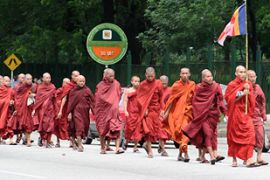Monks lead Myanmar protests
Hundreds march through Yangon amid growing tension with military government.

| In Video |
|
|
Police and plainclothes military intelligence agents reportedly videotaped the protesters in Yangon but took no action against them.
The monks had intended to hold a ceremony at Yangon’s Shwedagon pagoda, Myanmar‘s most important religious site, but authorities closed off access to the compound.
Tightly-controlled by its military rulers, public protest against the government is rare in Myanmar.
| Myanmar protests |
However the past month has seen demonstrations spread across the country after the government announced a massive hike in the price of fuel.
In the latest move, the monks are demanding an apology from the government after reports that hundreds were beaten during protests in the town of Pakokku two weeks ago.
Over the last few days Buddhist groups have organised marches in cities and townships across the country, reciting traditional religious chants to ward off evil.
They have threatened to boycott alms from the military and their families, a gesture likely to humiliate the ruling generals.
Duty
| Giving alms | ||
|
Giving donations to monks is an important spiritual duty for devout Buddhists.
Alms are given by lay people to monks to nurture merit; the gesture also connects the worshipper to the spirituality the monk represents.
Without such rites a devout Buddhist is seen as losing all chance of attaining nirvana or release from the cycle of rebirth. |
Giving alms to monks is considered an important duty of devout Buddhists.
In 1988, Myanmar‘s monks were credited with helping to rally popular support for a pro-democracy uprising led by student leaders that was crushed by the military, leaving hundreds dead.
Khin Ohmar, the coordinator for Thailand-based Asia Pacific People’s Partnership on Burma (APPPB), said monks had always been on the forefront of pro-democracy movements since the days before Myanmar won its independence from Britain.
“It is a tradition in Burma that monks lead protests when there is suffering and violence,” she told Al Jazeera.
“To them, the people’s wellbeing is important, free from hunger and poverty.”
She said people also supported the monks because they are considered the highest moral authority in society.
In a statement a group calling itself “The Alliance of All Burma Buddhist Monks” urged monks to stage peaceful marches on Tuesday in major cities including Yangon and Mandalay, the Thailand-based Irrawaddy magazine reported.
“We are preparing for this [protest]. If all monks agree, we will carry on. The main thing is we have to be united,” the magazine run by exiled Myanmar nationals quoted a monk in Myanmar as saying.
Alms boycott
 |
| Dozens of protesters have been arrested since the fuel price rise last month [www.dvb.com] |
On Sunday the group urged all monks not to accept alms from soldiers.
Earlier this month about 300 monks in Pakokku took a group of 20 government officials hostage to protest the violence against peaceful demonstrations.
A day earlier soldiers had reportedly fired warning shots as they moved in to break up a protest march organised by local monks. It was the first reported case of guns being used since the fuel price protests began.
The officials were later released, but the monks’ action gained huge public support.
On Sunday the APPPB reported that about 300 monks in the town of Magwe had boycotted alms offered by members of the pro-government Union Solidarity and Development Association (USDA), a group said to be behind attacks on several protests.
Khin Ohmar said monks call for an alms boycott when they see violence and injustice.
“This is only the fourth time an alms boycott has happened in Burma. The monks know there is no more food in people’s kitchens because the alms and donations have dried up.”
“In such situations, Buddhist teachings allow monks to refuse ‘tainted’ alms from those who use violence and commit injustices against the people.”


